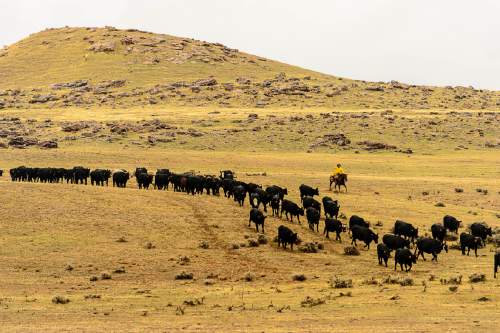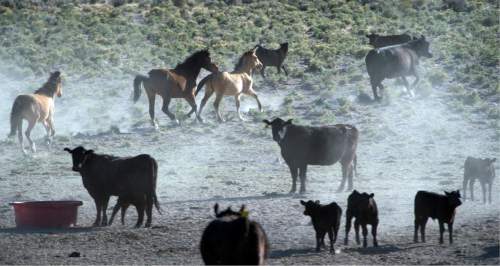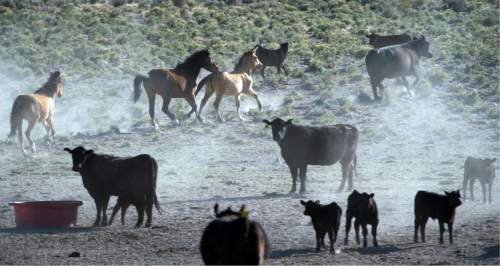This is an archived article that was published on sltrib.com in 2016, and information in the article may be outdated. It is provided only for personal research purposes and may not be reprinted.
In November, Robert "LaVoy" Finicum appeared at a packed cattlemen association meeting at the Piute County Courthouse in central Utah, bearing a simple message for fellow ranchers and a prominent member of the Utah attorney general's office.
Tear up your federal contracts that spell out how many cattle you can stock, for what time periods, and how much forage must be left after each season. It's your land, and militiamen will be available to back you up in resisting efforts by the Bureau of Land Management and Forest Service to evict your cows.
Finicum, the Arizona rancher who was the voice of the Malheur occupation until his death Tuesday, said the more ranchers who stood up to federal agencies, the less able the government would be to act against them, according to an audio recording of the meeting in Junction.
Tony Rampton, who heads the A.G.'s public lands section, was invited to address the ranchers, long fed up with federal bureaucrats telling them what they can and can't do on their grazing allotments. He agreed federal policies are failing ranchers and endangering their livelihoods, but cautioned against pursuing an unlawful course.
"I'm not arguing with you. All I'm saying is you have your choice to do it the way you want to do it. Call it civil disobedience, call it whatever you want to call it," Rampton told the cattlemen. "You have that choice but you need to understand when you make that choice, you live with the consequences."
Some of the ranchers who attended that meeting are now among a vanguard of Western ranchers — including several in Utah — disavowing contracts with the BLM and Forest Service at the urging of Finicum.
The attorney general's office declined to comment on Rampton's presence at the November meeting or the consequences to which he alluded.
Consequences for ranchers who disavow their contracts would likely include restrictions or outright loss of grazing allotments and eviction of cattle, according to legal and academic experts.
Another consequence is an escalation of tensions over the West's public lands, conflict that led to Finicum's death on the side of U.S. 395 in Oregon, where police shot him while arresting leaders of the Malheur National Wildlife Refuge occupation. The illegal armed encampment had been led since Jan. 2 by Ammon and Ryan Bundy, sons of Nevada rancher Cliven Bundy. The Bundy brothers and several others are now in jail, while four militants remain holed up at the refuge near Burns, Ore.
Ryan Bundy and two other Malheur leaders now in custody participated in the May 2014 ATV protest led by San Juan County Commissioner Phil Lyman into Utah's Recapture Canyon.
While Finicum is regarded as a martyred hero by the patriot movement, conservationists contend he was fomenting rebellion and anarchy by trying to persuade ranchers to illegally seize control of the public land on which they graze livestock. Critics were exasperated with occupation leaders' ability to come and go as they raised support for their cause in neighboring states.
Tuesday's arrests occurred while the leaders were en route to one such recruitment event. But for the three weeks before, leaders had traveled freely.
Ryan Bundy and Finicum left the refuge in mid-January and visited Cedar City, in part to generate support for the Jan. 23 property-rights forum hosted by the National Federal Lands Conference. This Ogden-based group was founded by right-wing ideologue Bert Smith ostensibly to promote constitutional principles. The group is focused on dismantling environmental laws and shedding public lands of federal oversight.
Organized by Kanosh lawyer Todd Macfarlane, the property-rights forum will be reprised Saturday in Boise, Idaho, where Ammon Bundy had hoped to speak before his arrest. One goal is to get ranchers to renounce their federal contracts in hopes of building "a critical mass" of public lands permittees willing to resist federal oversight of how they use public land.
On Jan. 13, Cedar City radio host Brian Hyde had Finicum in the studio for a two-hour broadcast defending the Malheur occupation.
The rancher repeated the plea he had made in Junction two months before, this time with more urgency and directly linking the plea to the Malheur standoff. He implored ranchers to join his campaign of defiance toward the BLM and Forest Service, asking them to send "notices of intent to withdraw" to the federal government, reading aloud an example of such a notice:
"Dear Solicitor General, I am a rancher in the county of ____ in the state of ___, and I am hereby canceling any contracts between me and the BLM and/or Forest Service. I will be responsible for my own range improvements from here on."
"It's that simple. You send it and get out from under that contractual obligation. ... If we are not brave, we shall not be free," Finicum told Hyde. "This is a call to action. I am asking you food producers, you ranchers, I'm pleading with you, stand up, cancel your contracts with the federal government. ... Stand up and show support for these ranchers up there [in Oregon] that are doing the same thing.
"If you do that, we give you our commitment, the Bundys give you their commitment. I, LaVoy Finicum, give you my commitment, that we will pool our resources and connections to protect you in your ranches. You will be free to run upon it as free citizens," he continued. "They [federal agencies] can send you any letter they want, fine you any amount they want. We promise you, this is not a light thing ... to stand beside you if at any moment they physically seek to curtail you in any way from ranching on your ranch. That belongs to you."
One of guest the speakers at the Piute County meeting in November was Cope Reynolds, an Arizona gun shop owner who participated in the 2014 Bundy standoff, which he described as a "history-changing event." His store in Show Low is called Southwest Shooting Authority of Arizona, with the motto "Our forefathers would be shooting by now."
He urged the ranchers to organize a militia to stand up for constitutional principles and defend ranchers against federal overreach.
"This whole BLM thing is legalized extortion. They are stealing from you. We aren't anti-government; we are anti-corruption in government. We will stand with the sheriff. People in militias are your neighbors. There's nothing to be scared of," Reynolds said. "If you don't stand with Cliven Bundy and LaVoy Finicum, can you face the Founding Fathers when you leave this world? What will you say to Thomas Jefferson?"
Finicum has long contended ranchers hold "property rights" to forage. During the settlement of the West, water rights were owned by those who first put the water to beneficial use, and Finicum argued the same applied to land.
"It's pre-emptive rights. The legal term is prior appropriation," Finicum told Piute ranchers.
"When I stand in line and I'm the first in line, I have established a right. It's self-evident. … This is a natural right," Finicum said. "Do we or do we not believe we have inalienable rights? That rights come to us from God and not man? If it comes to us from God and not man, when I stand here, I have created a right when I'm the first one in line. As long as I use this for continuous beneficial use, I have it."
But rights to the land remain valid only as long as ranchers defend them against federal oversight. Finicum insisted ranchers have "a natural right" to resist agency actions that would impinge on their access to the forage.
"I don't think that's the best way to deal with it. So what is the other way? There's a limit to what I can do," Tony Rampton said in response to Finicum's presentation. "Going to the courts, going to administrative agencies, you don't have to agree with that. You guys have got your own free agency, you can do whatever you want. This is a free country, but you need to understand there are consequences."
"What about the consequences of the choices they make?" a rancher shot back.
"My job is to push back," Rampton replied. "I have to do it within the law. I don't have a choice."
At this point, the state's lawyer was handed a copy of the U.S. Constitution as the audience applauded. Rampton exited the meeting, leaving the Constitution behind.
"Sometimes these guys who try to help don't fully understand what the law, liberty and freedom is. I tried to give him the law and he left," said an unidentified speaker. "I'm not advocating breaking the law. There are laws out there that are illegal. When the federal government says something, everybody jumps. That has to stop."
Brian Maffly covers public lands for Salt Lake Tribune. Maffly can be reached at bmaffly@sltrib.com or 801-257-8713. Twitter: @brianmaffly







